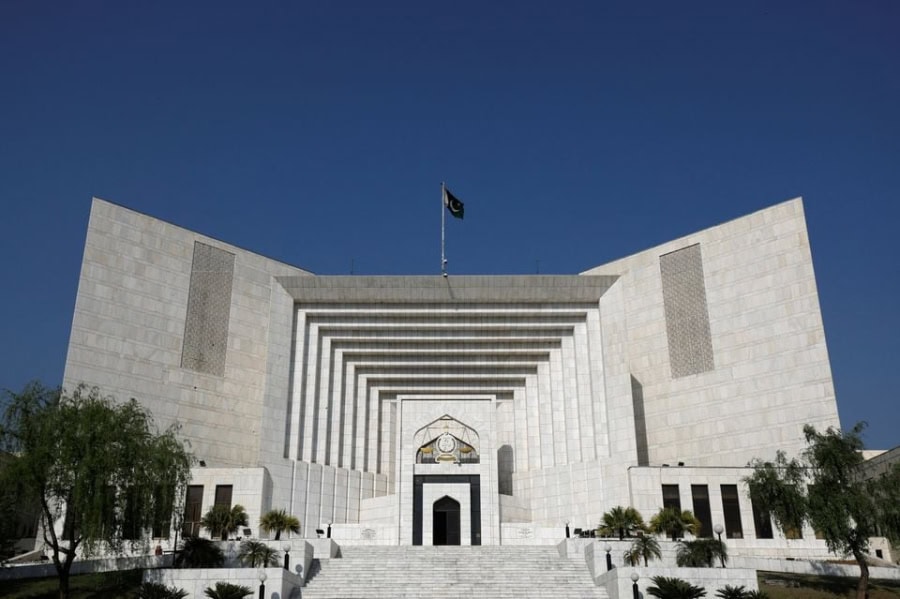ISLAMABAD- The Supreme Court of Pakistan on Friday announced a verdict in a case related to the petitions seeking general elections within 90-day time, ruling that the constitutional crisis took place in the country soon after dissolution of the National Assembly.
The top court ruled that the act of the president to dissolve the assembly after no-confidence motion was unconstitutional, and ordered all the relevant authorities to ensure elections on the agreed date.
“The president did not have the powers to dissolve the assembly. After no-confidence motion, the president cannot dissolve the assembly on the advice of the prime minister,” held a SC three-member bench led by Chief Justice of Pakistan Qazi Faez Isa while announcing the verdict.
The apex court held that they took suo motu on the situation.
The national assembly, the court held, was dissolved on August 9 on the advice of the then prime minister –a move which is a fact.
The agreement on the election date was reached after a meeting on November 2, 2023. At that time, the entire country was under the impression that general elections were not on the horizon. The adherence to the constitution and the rule of law is a fundamental responsibility for every citizen.
After the dissolution of the National Assembly, differences arose between the President and the Election Commission. The aim was to ensure that the President and the Election Commission collaborated for the greater good of the nation. The Supreme Court ruled that the President and the Election Commission should operate within their respective domains. Given the significant constitutional role held by the President, it is primarily his duty to facilitate cooperation with the Election Commission.
In his letter, the President stated that the Election Commission should announce the date after consulting with provincial governments. There was no response from the Election Commission regarding the President’s letter. The matter of setting the election date is not within the purview of the Supreme Court or any other court.
The President has the option to seek a public referendum if he wished for public input, as provided by Article 186. There is no provision for deviation from the constitution. The constitution has been in place for over 50 years, and no constitutional institution can claim ignorance. Fifteen years ago, the constitution was violated.
Violations of the constitution have severe consequences. Regrettably, Pakistan has witnessed multiple instances of the constitution being undermined. Only constitutional institutions can make critical decisions in the interest of the people.
It is hoped that all constitutional institutions will demonstrate wisdom in the future. The Supreme Court also noted that the National Assembly was dissolved when a vote of no-confidence against the Prime Minister was tabled. At that time, the Prime Minister did not have the authority to dissolve the National Assembly. The Prime Minister’s unilateral action created a constitutional crisis.
Non-constitutional dissolution of the National Assembly is considered a breach of trust. The dissolution of the Assembly was intended to prevent the motion of no-confidence from proceeding. A five-member bench, headed by the Chief Justice, declared this dissolution of the Assembly as unconstitutional. A fellow judge also wrote that consequences of unconstitutional actions must follow.
Non-constitutional dissolution of the Assembly places a burden on national institutions and the public. It is now time to not only respect the constitution but also to learn from the constitutional history of the country.
Only constitutional institutions can make critical decisions in the interest of the people. We hope that all constitutional institutions will demonstrate wisdom in the future.
The Supreme Court also noted that the National Assembly was dissolved when a vote of no-confidence against the Prime Minister was tabled. At that time, the Prime Minister did not have the authority to dissolve the National Assembly. The Prime Minister’s unilateral action created a constitutional crisis.
Non-constitutional dissolution of the National Assembly is considered a breach of trust. The dissolution of the Assembly was intended to prevent the motion of no-confidence from proceeding.
The top court had declared this dissolution of the Assembly as unconstitutional. One of the judges wrote that consequences of unconstitutional actions must follow.
Non-constitutional dissolution of the Assembly places a burden on national institutions and the public. It is now time to not only respect the constitution but also to learn from the constitutional history of the country.










